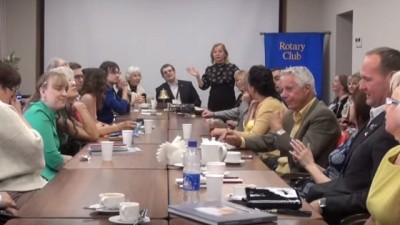My recommendations for books and videos about Russia
‘Russia: A Reading Guide', Center on Global Interests (CGI), August 30, 2016
— 12 experts share the 50 books that shaped their understanding of Russia. Only one book is mentioned by two people.
Richardson, Paul E. & Mikhail Mondasov. The Spine of Russia, July 2016, 200 pages.
— In the Fall of 2015, a Russian and American journalist travelled 6,000 kilometers from Russia’s northwestern corner in the Arctic to Sochi, in the tropical climes of the Black Sea. The group tells the stories of Russians whose life and work is taking the country forward, and what they feel patriotic about, what is important to them.
Stone, Oliver. (book) The Putin Interviews: Oliver Stone Interviews Vladimir Putin, Skyhorse Publishing Inc, June 16, 2017, 288 pages. — Transcripts of all 20 hours from video.
Stone, Oliver. (video) ‘The Putin Interviews’, (4 hours total video) Showtime cable TV, June 12-15, 2017.
- Vimeo.com (1 hour each): Part 1 — Part 2 — Part 3 — Part 4
- John Batchelor interviews Stephen F. Cohen and Oliver Stone, (40 min. video) 77-WABC Radio, June 9, 2017.
More books about Russia
To be fair to my list of books above, I include lists below recommended by journalists. I feel that many (not all) of these books are biased, because they seem to be limited in scope, often stuck in a paradigm of one ‘super policeman state’ rather than respecting wider regional players.
Basulto, Dominic. 'The 7 Best Books of Summer 2016 for the Avid Russia Watcher', Medium, June 16, 2016. — Former columnist for The Washington Post’s “Innovations”
Begley, Sarah. '9 Books That Can Help You Understand Russia Right Now', Time magazine, February 15, 2017.
Elkin, Dimitri. 'Top 10 books on Russia in 2016', Russia Direct, December 30, 2016. — The best books of 2016 include those that take a closer look at U.S.-Russia relations during the Cold War and perestroika, enabling readers to better understand the current Putin era.
Honig, Michael. 'Top 10 books on Vladimir Putin's Russia', The Guardian, April 20, 2016.
Lebedev, Sergei. '10 Books That Explain Russia Today', Publishers Weekly, February 19, 2016 — Lebedev, who was born in Moscow in 1981, picks 10 books that explain Russia's complicated past and present.
Weafer, Chris. 'Six ‘must-read’ books on Russia from last 25 years', Johnson's Russia List, September 10, 2015.
'The Top 10 Summer Books for Russia Watchers', The Moscow Times, July 2, 2015.
Readers: Enter your recommendations in Comments, below.

